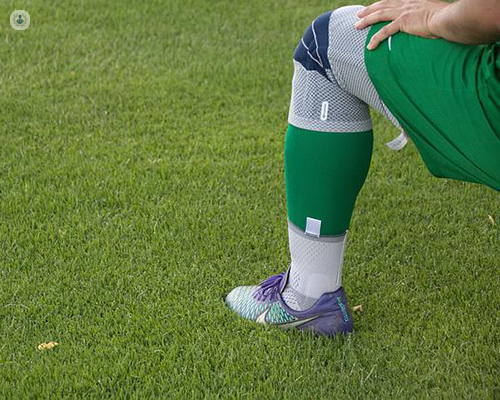What is anterior knee pain, and who does it primarily affect?
Written by:In this article below, revered consultant orthopaedic surgeon, Mr Muhammad Adeel Akhtar, discusses anterior knee pain at length, including who it mainly affects, and how the cause of this specific knee pain is diagnosed and treated.

What is anterior knee pain, and who does it primarily affect?
Anterior knee pain, often referred to as patellofemoral pain syndrome (PFPS), is a common condition characterised by pain around or behind the patella (kneecap). It frequently affects athletes, adolescents, and those with high physical activity levels. Evidence-based management of PFPS involves a multifaceted approach, integrating clinical expertise with the best available research evidence.
How is the cause of anterior knee pain diagnosed?
Accurate diagnosis is crucial for effective management. PFPS is typically diagnosed through clinical evaluation, including a thorough patient history and physical examination. Key diagnostic features include anterior knee pain exacerbated by activities such as squatting, running, and stair climbing. Imaging studies, like MRI or X-rays, are reserved for ruling out other potential causes of knee pain.
What are the main non-surgical treatment options for anterior knee pain?
There are many non-surgical treatment options for anterior knee pain. The main ones include:
-
Exercise therapy: A cornerstone of PFPS management is tailored exercise therapy. Strengthening and stretching exercises targeting the quadriceps, hamstrings, and hip abductors are essential. Studies indicate that a combination of strengthening and neuromuscular training can significantly reduce pain and improve function.
-
Patellar taping and bracing: Patellar taping can provide short-term pain relief by altering patellar alignment and improving muscle activation patterns. Similarly, knee braces may help stabilize the patella and reduce pain during activities.
-
Foot orthoses: Custom or prefabricated foot orthoses can be beneficial, particularly for patients with overpronation. These devices help realign the lower limb, thereby reducing stress on the patellofemoral joint.
-
Education and activity modification: Educating patients about the nature of PFPS and the importance of activity modification is crucial. Gradual return to activity, avoiding aggravating movements, and incorporating low-impact exercises can aid in recovery.
Also, nonsteroidal anti-inflammatory drugs (NSAIDs) may be prescribed to manage pain and inflammation. Additionally, modalities like ultrasound therapy, electrical stimulation, and acupuncture have been explored, though evidence supporting their efficacy remains limited.
What are the main surgical options?
Surgery for anterior knee pain is an option which the doctor leaves open to the patient to consider (to be discussed with the surgeon on a case-by-case basis according to the cause of symptoms). Procedures may include lateral release, medial patellofemoral ligament reconstruction, or patellar realignment.
To book an appointment with Mr Muhammad Adeel Akhtar today, just visit his Top Doctors profile.


